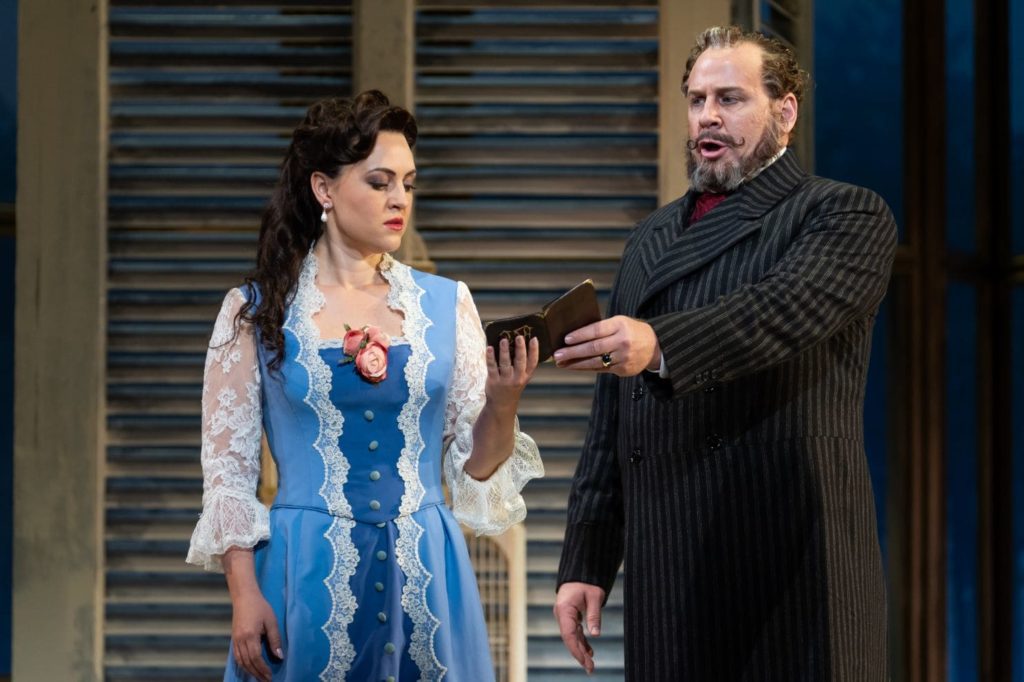Washington National Opera’s ‘Traviata’
By • October 11, 2018 0 987

“Familiarity breeds contempt” is an abiding expression applicable to all sorts of situations — television shows (and their stars) that have overstayed their welcomes, advertising jingles or popular songs that have played one too many times in the soundtrack of our lives, political advertisements that go from fresh and edgy to boring and mean in about three viewings.
That’s generally not the case for the world of opera audiences, if not always critics, who welcome familiar titles among the seasonal offerings, even if some of the music over the years has become Muzak. Giuseppe Verdi’s 1853 — yes, it’s over 160 years old — opera “La traviata” seems always welcome in the great and grand opera houses of the world, no matter how it’s staged, the performers who star in it, the conductor or, for that matter, the times we live in.
That kind of familiarity is a guarantor of sorts for filling the seats in the house, but it’s also a guarantor of the classic sort, as an example of a great work of art in its genre.
Small wonder then that “La traviata” led off Washington National Opera’s 2018-19 season Saturday, Oct. 6, with a production that swayed and swooned like a runaway form of dancing, sometimes dark and desperate, sometimes gay and madcap, sometimes in a setting where life-altering importuning and debate was conducted in a soothing, pastoral setting. In the end, after frantic, runaway, reckless emotions on party display, it landed where it must, in a dank and bitter place, amid last, faint hope and a sudden end.
As directed by WNO Artistic Director Francesca Zambello, and conducted at a sometimes frenetic pace by Renato Palumbo, this “Traviata,” running through Oct. 21, delivered the opera’s large store of riches: Verdi’s diverse and astonishingly music chief among them. There is not — any more than there is in “Romeo and Juliet,” a happy ending, which is hardly a spoiler alert, and that’s one of the familiar, expected rewards of the opera, that expansive moment of anticipated grief.
It is, after all, the tale of a free-spirited, life-is-a-joy-and-a-party 19th-century courtesan — or “kept woman,” if you will — living the high life of parties that don’t break up till dawn in Paris, enjoying lovers if not true love. Until, of course, she meets the impetuously reckless, handsome and youthful Alfredo Germont, who pursues her with a passion that’s all encompassing, as only young love can present convincingly.
Already ailing — from devastating consumption, a disease dealt with in the period’s poetry and music with almost compulsive romanticism — Violetta leaves her life, and moves into a country chateau with Alfredo, only to have Germont père — Giorgio — arrive, sternly disapproving of her lifestyle and insisting that she leave Alfredo lest she destroys his life and that of his sister and family. She does so, and returns to the salon life, to her baron lover and, after a destructive encounter at a party (which, sorry to say, looked like leftover bits from “Carmen”) among all concerned, ends up back in a hospital for the dying.
Zambello tells the story by way of a flashback to the beginning, Violetta emerging from her hospital bed in a dazzling dress, and not long thereafter a full, first-flush-of-love meeting with Roberto, as the famous “brindisi” or drinking song ensues, so rich and familiar that it seems to levitate and fill the stage with good humor and romantic possibility, even that of love, even for a skeptical Violetta.
That Violetta must end up where she does (and in a most startling way), that Roberto will almost destroy their love with jealousy, that the father will finally recognize Violetta’s worth and value are all preordained like the sun coming up, and still devastating.
For that you can give a lot of credit to Russian soprano Venera Gimadieva, whose diverse range exposes all her confidence, her insecurities, her struggles singing, “Ah, maybe he’s the one,” opting momentarily for “Sempre libera,” to be “always free.” Except that in all her encounters — with the life of a kept woman, with the overwhelming Alfredo, with the demands of the father and with death itself, she succumbs.
The performance on the whole seems a little fast-paced, as if rushing to get to the dying. Tenor Joshua Guerrero, as Alfredo, while he has an appealing bearing and a mostly strong voice, is sometimes overeager and skittish in his acting and singing, but baritone Lucas Meacham as Giorgio Germont is a stolid, rock-steady presence on stage, implacable and insistent. Their duet is evenly matched. It’s almost as if they were the better couple musically, instead of antagonists.
I’m sure that experience and familiarity with “La traviata” are important — familiarity of any sort. Alexandre Dumas authored the source material in a novel, and there have been several film versions of the opera. I kept thinking back to a 1930s film version — not of the opera, but of the woman’s story — called “Camille,” in which Greta Garbo gave you an idea of what the music of Violetta’s life might sound like, even without music.
Opening night at least, saw a rapt audience, which included several young children, intensely involved in her fate. The end, given the familiarity, still came as a shock and a heartbreak.

